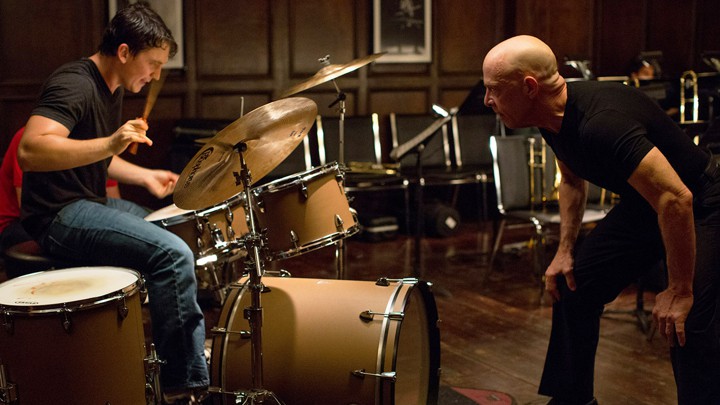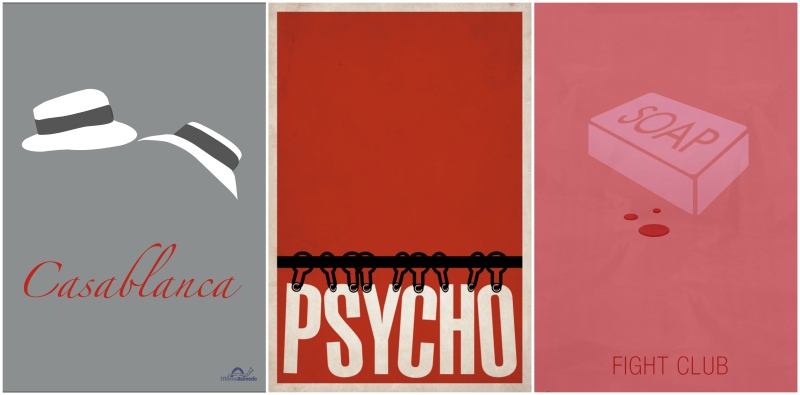Directed by: Damien Chazelle
Cast: J.K. Simmons [Terence Fletcher], Miles Teller [Andrew], Melissa Benoist [Nicole]
Having an instructor, Terence, with terrifying teaching methods, Andrew Neiman has ambitions to rise up in his elite music conservatory, Shaffer’s Jazz Orchestra, and his ambitions quickly turn into obsession as his cruel teacher pushes him to the brink of his ability and sanity.
Based loosely on: Experiences of the film’s director Damien Chazelle
My rating: 9/10

Narrative aspects
This film is made up of a touching story involving a dedicated and obsessive artist who wants o be the best at their art, playing music. It is filled with the sense of motivation rather than lowering one’s self-esteem, and thus excelling and pushing the boundaries of someone’s potential. The film starts with the main character’s, Andrew Neiman, background and enlightening the audience with who he is and what he does while showing what his true passions are. This is important to understand the future choices he makes throughout the film, and which lead him to his desired success at the end. Andrew steps up on the ladder of perseverance no matter what the hardship. It is a bildungsroman at its core, while the characters around him give him a nudge negatively or positively so that he ensures that his dream becomes a reality. With a linear narrative, it starts from step one and moves to step two next and on, from being part of a mediocre band at Shaffer’s, then advancing to the performing band and heart of Terence Fletcher, all while working on his social interactions and meeting a girl. In the end, the film has a well-rounded plot from the rising action to the slightly ambiguous resolution.
This film also sheds light on the trials faced by an aspiring musician, or any artist in general, clearly depicting the message that “the real world isn’t for the ones with the faint of hearts”. Cases of emotional and psychological trauma have been found after being such music or extracurricular groups, where the environment is competitive and mistakes are something that is forbidden. Through Andrew, any musician even if not exposed to being part of such a highly-ranked music group lie Shaffer’s Jazz Orchestra, would feel disturbed and greatly affected by all that he goes through the entire film. In one scene, Andrew cannot seem to get the tempo right for the song on the sheet music and he starts to take the strategy of his teacher. The audience sees him swearing at himself with pure anger and self-loathe, while his palms and fingers start to blister and bleed. It is an uncomfortable image and one that could make someone look away from feeling despair as Andrew starts to hate himself for the moment just so he can play the part like he knows he can. It is a powerful scene that shows the extent to which a human being can perform if pushed to the limit.
Infer & Deduce: According to my personal interpretation, the reason behind the title of this film, ‘Whiplash’ could be one from the name of the injury caused to the neck by the sudden force of hitting an object (like sitting in a car and hitting a pole or another car at a high speed). This could mirror the effect of Andrew playing the drums as he’s seen devoting his entire energy capacity to it and almost earning the permanent injury of some sort of muscle cramp to his arms or his neck for that matter. Looking at the definition of Whiplash, it could also mean “an abrupt snapping motion or change of direction resembling the lash of a whip” or “to beat, hit, throw, etc., with or as if with a whiplash”, which both apply to the intensified display of behaviour by Andrew the protagonist.
Moreover another explanation that is quite plausible is that the two main songs for this film are called ‘Caravan’ and ‘Whiplash’, with the latter being the one that actually led to Andrew breaking up and being put to the ground by Fletcher, who humiliated him in front of everyone at practice for the first time for not being able to play with tempo (which I analyse further below). This broke him down and actually changed his mindset about the whole jazz school and their teachings. Andrew grows more determined to get the music right and it is after being scolded in class for not being able to play the song ‘Whiplash’ on his instrument, the drums.
Technical Aspects
There are no visual effects in this film nor any choreography that could be said for movies like ‘Baby Driver’ or ‘Inception’, or ‘La La Land’ by Chazelle as well. However, the emphasis is put on the transition, and the jump-cuts to be precise. A film about music and musical performances, all ensembles have cleverly timed cuts to the beat as well as interesting placement of the camera. These are mostly made of extreme close-ups of the instruments the musician is playing which can be prominently heard in the song at that particular moment, with their hands appearing the still shots as well.
A scene after Fletcher scolds Andrew about not being on time with the tempo (analysis below), Andrew finds a wave of motivation and starts practising intensively. This scene has very swift jump-cuts between different parts of the drum kit, which are all close-up shots, and in sync with the drum beat. It heightens the fast pace of the music and effective;y portrays the heated moment Andrew is going through while playing, how he uses his entire energy capacity to play out on the drum kit. To keep the attention off of the actor for a few moments, the close-up shots emphasise on the instruments and the capability they are made for.
This distraction from the actor forms a brilliant miniature montage of shots while it is intelligently done to avoid the main question on everyone’s mind: “Is Miles Teller really playing the drums?”. Reading an article about the topic, it stated that Teller is a talented drummer and was part of a band though he played rock music in his past, which is extremely far from the jazz played in the film. He spent a couple of months learning and training in the jazz field of music to have the realistic effect of playing, however, the music pieces and other demands by Fletcher are quite complex. Thus, Chazelle used the art of clever editing and shot positions to at times fill in a double to play the drum pieces, which is why the emphases on the instruments fit in well. He took playing music pieces to the next level when making ‘La La Land’, where Ryan Gosling, playing Sebastian the protagonist, actually learnt all the piano songs from knowing nothing at all, and which resulted in having long one-take shots that clearly show that there is no double present.
Favourite Scene
Being the first time he plays in Terence Fletcher’s band, Andrew Neiman entered the room with a positive vibe though it starts to turn into humiliation once he cannot get the tempo right of the song ‘Whiplash’. He witnesses the true side of Fletcher, being terrifying a having now care for not embarrassing the musicians he conducts. Before Andrew knows it, all his motivation and self-esteem shatters into nothing.
This scene is one of my favourites since it really shows the brilliant acting done by J. K. Simmons, Fletcher, as well as Miles Teller, Neiman. Keeping the performances by these astounding actors aside, the scene conveys a powerful force of emotion from the teacher to the student to the other students in the room and then to the audience, in a sort of four-dimensional cycle. Everyone is frustrated and confused during this scene on screen, with Fletcher getting angry about Andrew’s incapability of playing the song on the right tempo, then Andrew feeling frustrated that whatever he is doing is wrong. In result, the other musicians are frustrated as well since this new-comer is supposed to be good, as they have heard, though does not prove that point at all. The audience then feels the frustration of the characters in the scene and further experience confusion, and dread to how this scene would play out and escalate.
To add on, Fletcher tries so hard to act nice for the many times at the start that Andrew messes up until the audience is immensely surprised with him hurling the chair at the drummer, who is close to not dodging it. It is at this moment that the viewer knows that what Fletcher says and does is real and that no one wants to be on his bad side. It is an attitude like this that would make one start to question his ethics and feel reluctant towards wanting him to interact with anyone in general. Amongst the storm of cursing and shouting, the camera also glances to the other musicians in the room for a moment. They constantly stare at a single spot, fearing for their lives as it seems. It becomes apparent that Fletcher has treated others in the band with the same attitude before.
With this scene, the reality of working in a highly competitive and professional setting grows clear. Personally being a musician, I felt appalled through the entirety of the film while watching it. I would never have the courage to be part of something so prestigious or qualified. Observing Andrew’s determination was inspiring for me, he acted as a minor role model for me, but the thought of having a tutor like Fletcher always brings a return back to my mind, shadowing over my confidence.
What would I do differently?
The film was touching and a seemingly close example to what an audience would expect would happen in such a competitive industry, and how people would be treated. However, it is quite of a traumatising representation for both the characters to go through and the audience to watch so having a slightly less intensified effect of the torture and psychological problems one is surprisingly susceptible to with such a venture. It instils fear into the viewer, which could in turn maybe push them away from pursuing their passion for music or any of the arts, while for others it may motivate them more. Though the film may be a magnified negative portrayal of reality, it is extremely effective and leaves a memory as well as an emotional effect to think about on the audience, which the director intended on.
Moreover, I would work on changing the image of the teacher that some criticised at the end, with his attitude being that he feels accomplished because without having pushed Andrew to where he did, the drummer wouldn’t have reached the great performance at the end of the film. In a loose sense, it makes it seem as the film is justifying the torture and hard-pushing to be done on students to open up and reach their limits, which is quite horrid actually. Surely, the director did not intend on it to be received by some like this as it was all about Andrew’s own motivation and willpower that led to his success, and that Damien Chazelle, the director, loosely based the film plot on his own experiences as a young drummer.
Further Research Areas:
‘Whiplash’ and Damien Chazelle
8 Hardships Only Independent Musicians Understand
6 Qualities That All Successful Musicians Have
Drummer Peter Erskine on Jazz Flick ‘Whiplash’
Getting Jazz Right in the Movies
What Whiplash Gets Wrong About Genius, Work, and the Charlie Parker Myth
‘Whiplash’ actor Miles Teller really playing the drums?
Witnessing an Abusive Relationship – Whiplash
Is “Whiplash” about an abusive relationship?
Music and trauma: the relationship between music, personality, and coping style
Music teacher sentenced to 11 years in prison as abuse film Whiplash prepares for Oscars
